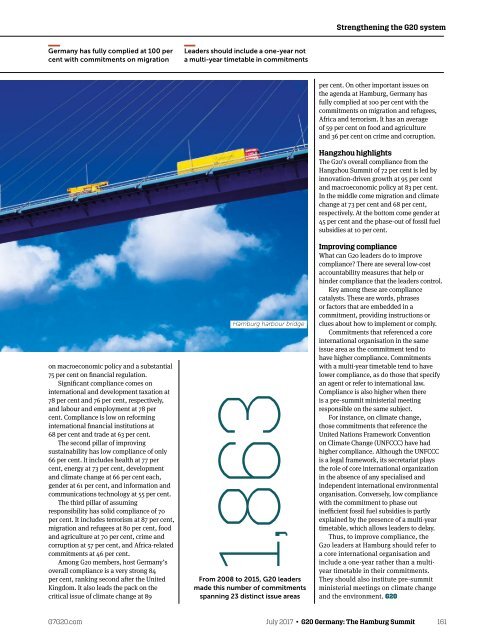G20-Germany-Hamburg-2017
mo.rami@trmg.co.uk
mo.rami@trmg.co.uk
Create successful ePaper yourself
Turn your PDF publications into a flip-book with our unique Google optimized e-Paper software.
Strengthening the <strong>G20</strong> system<br />
<strong>Germany</strong> has fully complied at 100 per<br />
cent with commitments on migration<br />
Leaders should include a one-year not<br />
a multi-year timetable in commitments<br />
on macroeconomic policy and a substantial<br />
75 per cent on financial regulation.<br />
Significant compliance comes on<br />
international and development taxation at<br />
78 per cent and 76 per cent, respectively,<br />
and labour and employment at 78 per<br />
cent. Compliance is low on reforming<br />
international financial institutions at<br />
68 per cent and trade at 63 per cent.<br />
The second pillar of improving<br />
sustainability has low compliance of only<br />
66 per cent. It includes health at 77 per<br />
cent, energy at 73 per cent, development<br />
and climate change at 66 per cent each,<br />
gender at 61 per cent, and information and<br />
communications technology at 55 per cent.<br />
The third pillar of assuming<br />
responsibility has solid compliance of 70<br />
per cent. It includes terrorism at 87 per cent,<br />
migration and refugees at 80 per cent, food<br />
and agriculture at 70 per cent, crime and<br />
corruption at 57 per cent, and Africa-related<br />
commitments at 46 per cent.<br />
Among <strong>G20</strong> members, host <strong>Germany</strong>’s<br />
overall compliance is a very strong 84<br />
per cent, ranking second after the United<br />
Kingdom. It also leads the pack on the<br />
critical issue of climate change at 89<br />
<strong>Hamburg</strong> harbour bridge<br />
1,863<br />
From 2008 to 2015, <strong>G20</strong> leaders<br />
made this number of commitments<br />
spanning 23 distinct issue areas<br />
per cent. On other important issues on<br />
the agenda at <strong>Hamburg</strong>, <strong>Germany</strong> has<br />
fully complied at 100 per cent with the<br />
commitments on migration and refugees,<br />
Africa and terrorism. It has an average<br />
of 59 per cent on food and agriculture<br />
and 36 per cent on crime and corruption.<br />
Hangzhou highlights<br />
The <strong>G20</strong>’s overall compliance from the<br />
Hangzhou Summit of 72 per cent is led by<br />
innovation-driven growth at 95 per cent<br />
and macroeconomic policy at 83 per cent.<br />
In the middle come migration and climate<br />
change at 73 per cent and 68 per cent,<br />
respectively. At the bottom come gender at<br />
45 per cent and the phase-out of fossil fuel<br />
subsidies at 10 per cent.<br />
Improving compliance<br />
What can <strong>G20</strong> leaders do to improve<br />
compliance? There are several low-cost<br />
accountability measures that help or<br />
hinder compliance that the leaders control.<br />
Key among these are compliance<br />
catalysts. These are words, phrases<br />
or factors that are embedded in a<br />
commitment, providing instructions or<br />
clues about how to implement or comply.<br />
Commitments that referenced a core<br />
international organisation in the same<br />
issue area as the commitment tend to<br />
have higher compliance. Commitments<br />
with a multi-year timetable tend to have<br />
lower compliance, as do those that specify<br />
an agent or refer to international law.<br />
Compliance is also higher when there<br />
is a pre-summit ministerial meeting<br />
responsible on the same subject.<br />
For instance, on climate change,<br />
those commitments that reference the<br />
United Nations Framework Convention<br />
on Climate Change (UNFCCC) have had<br />
higher compliance. Although the UNFCCC<br />
is a legal framework, its secretariat plays<br />
the role of core international organization<br />
in the absence of any specialised and<br />
independent international environmental<br />
organisation. Conversely, low compliance<br />
with the commitment to phase out<br />
inefficient fossil fuel subsidies is partly<br />
explained by the presence of a multi-year<br />
timetable, which allows leaders to delay.<br />
Thus, to improve compliance, the<br />
<strong>G20</strong> leaders at <strong>Hamburg</strong> should refer to<br />
a core international organisation and<br />
include a one-year rather than a multiyear<br />
timetable in their commitments.<br />
They should also institute pre-summit<br />
ministerial meetings on climate change<br />
and the environment. <strong>G20</strong><br />
G7<strong>G20</strong>.com July <strong>2017</strong> • <strong>G20</strong> <strong>Germany</strong>: The <strong>Hamburg</strong> Summit 161
















